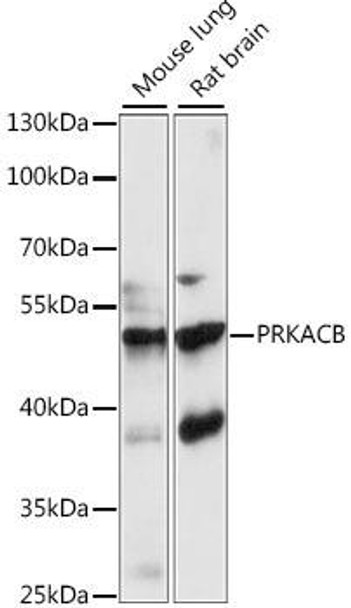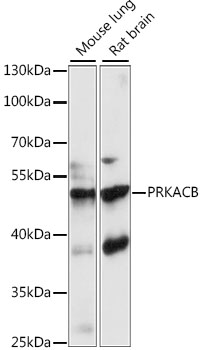Anti-PRKACB Antibody (CAB15709)
- SKU:
- CAB15709
- Product type:
- Antibody
- Reactivity:
- Mouse
- Reactivity:
- Rat
- Host Species:
- Rabbit
- Isotype:
- IgG
- Antibody Type:
- Polyclonal Antibody
- Research Area:
- Cell Biology
Description
| 抗体名: | Anti-PRKACB Antibody |
| 抗体コード: | CAB15709 |
| 抗体サイズ: | 20uL, 50uL, 100uL |
| 申し込み: | WB |
| 反応性: | Mouse, Rat |
| 宿主種: | Rabbit |
| 免疫原: | Recombinant fusion protein containing a sequence corresponding to amino acids 1-351 of human PRKACB (NP_002722.1). |
| 申し込み: | WB |
| 推奨希釈: | WB 1:500 - 1:2000 |
| 反応性: | Mouse, Rat |
| ポジティブサンプル: | Mouse lung, Rat brain |
| 免疫原: | Recombinant fusion protein containing a sequence corresponding to amino acids 1-351 of human PRKACB (NP_002722.1). |
| 精製方法: | Affinity purification |
| ストレージバッファ: | Store at -20'C. Avoid freeze / thaw cycles. Buffer: PBS with 0.02% sodium azide, 50% glycerol, pH7.3. |
| アイソタイプ: | IgG |
| 順序: | MGNA ATAK KGSE VESV KEFL AKAK EDFL KKWE NPTQ NNAG LEDF ERKK TLGT GSFG RVML VKHK ATEQ YYAM KILD KQKV VKLK QIEH TLNE KRIL QAVN FPFL VRLE YAFK DNSN LYMV MEYV PGGE MFSH LRRI GRFS EPHA RFYA AQIV LTFE YLHS LDLI YRDL KPEN LLID HQGY IQVT DFGF AKRV KGRT WTLC GTPE YLAP EIIL SKGY NKAV DWWA LGVL IYEM AAGY PPFF ADQP IQIY EKIV SGKV RFPS HFSS DLKD LLRN LLQV DLTK RFGN LKNG VSDI KTHK WFAT TDWI AIYQ RKVE APFI PKFR GSGD TSNF DDYE EEDI RVSI TEKC AKEF GEF |
| 遺伝子ID: | 5567 |
| Uniprot: | P22694 |
| セルラーロケーション: | Cell membrane, Cytoplasm, Lipid-anchor, Membrane, Nucleus |
| 計算された分子量: | 29kDa/36kDa/39kDa/40kDa/41kDa/46kDa |
| 観察された分子量: | 50kDa |
| 同義語: | PRKACB, PKA C-beta, PKACB, PKAC-beta |
| バックグラウンド: | The protein encoded by this gene is a member of the serine/threonine protein kinase family. The encoded protein is a catalytic subunit of cAMP (cyclic AMP)-dependent protein kinase, which mediates signalling though cAMP. cAMP signaling is important to a number of processes, including cell proliferaton and differentiation. Multiple alternatively spliced transcript variants encoding distinct isoforms have been observed. |
| UniProt Protein Function: | PKACB: Mediates cAMP-dependent signaling triggered by receptor binding to GPCRs. PKA activation regulates diverse cellular processes such as cell proliferation, the cell cycle, differentiation and regulation of microtubule dynamics, chromatin condensation and decondensation, nuclear envelope disassembly and reassembly, as well as regulation of intracellular transport mechanisms and ion flux. Regulates the abundance of compartmentalized pools of its regulatory subunits through phosphorylation of PJA2 which binds and ubiquitinates these subunits, leading to their subsequent proteolysis. A number of inactive tetrameric holoenzymes are produced by the combination of homo- or heterodimers of the different regulatory subunits associated with two catalytic subunits. cAMP causes the dissociation of the inactive holoenzyme into a dimer of regulatory subunits bound to four cAMP and two free monomeric catalytic subunits. The cAMP-dependent protein kinase catalytic subunit binds PJA2. Isoform 1 is most abundant in the brain, with low level expression in kidney. Isoform 2 is predominantly expressed in thymus, spleen and kidney. Isoform 3 and isoform 4 are only expressed in the brain. Activated by cAMP. Belongs to the protein kinase superfamily. AGC Ser/Thr protein kinase family. cAMP subfamily. 9 isoforms of the human protein are produced by alternative splicing. |
| UniProt Protein Details: | Protein type:Protein kinase, Ser/Thr (non-receptor); Kinase, protein; Protein kinase, AGC; EC 2.7.11.11; AGC group; PKA family Chromosomal Location of Human Ortholog: 1p31.1 Cellular Component: nucleoplasm; centrosome; perinuclear region of cytoplasm; plasma membrane; cytosol; cAMP-dependent protein kinase complex Molecular Function:protein binding; cAMP-dependent protein kinase activity; ubiquitin protein ligase binding; magnesium ion binding; ATP binding Biological Process: epidermal growth factor receptor signaling pathway; fibroblast growth factor receptor signaling pathway; nerve growth factor receptor signaling pathway; water transport; activation of protein kinase A; glucose metabolic process; pathogenesis; negative regulation of meiotic cell cycle; signal transduction; protein amino acid phosphorylation; gluconeogenesis; G-protein signaling, coupled to cAMP nucleotide second messenger; synaptic transmission; phospholipase C activation; triacylglycerol catabolic process; carbohydrate metabolic process; neural tube closure; energy reserve metabolic process; renal water homeostasis; innate immune response; blood coagulation; transmembrane transport; regulation of insulin secretion |
| NCBI Summary: | The protein encoded by this gene is a member of the serine/threonine protein kinase family. The encoded protein is a catalytic subunit of cAMP (cyclic AMP)-dependent protein kinase, which mediates signalling though cAMP. cAMP signaling is important to a number of processes, including cell proliferaton and differentiation. Multiple alternatively spliced transcript variants encoding distinct isoforms have been observed. [provided by RefSeq, Jul 2014] |
| UniProt Code: | P22694 |
| NCBI GenInfo Identifier: | 125210 |
| NCBI Gene ID: | 5567 |
| NCBI Accession: | P22694.2 |
| UniProt Secondary Accession: | P22694,Q14VH1, Q59GC0, Q5BNE9, Q5BNF0, Q5BNF1, Q5BNF2 Q5BNF3, Q5CZ92, B1APG4, B4DKB0, B4E2Q1, |
| UniProt Related Accession: | P22694 |
| Molecular Weight: | 37,110 Da |
| NCBI Full Name: | cAMP-dependent protein kinase catalytic subunit beta |
| NCBI Synonym Full Names: | protein kinase, cAMP-dependent, catalytic, beta |
| NCBI Official Symbol: | PRKACB |
| NCBI Official Synonym Symbols: | PKACB; PKA C-beta |
| NCBI Protein Information: | cAMP-dependent protein kinase catalytic subunit beta; protein kinase A catalytic subunit beta; cAMP-dependent protein kinase catalytic beta subunit isoform 4ab |
| UniProt Protein Name: | cAMP-dependent protein kinase catalytic subunit beta |
| Protein Family: | cAMP-dependent protein kinase |
| UniProt Gene Name: | PRKACB |
| UniProt Entry Name: | KAPCB_HUMAN |


